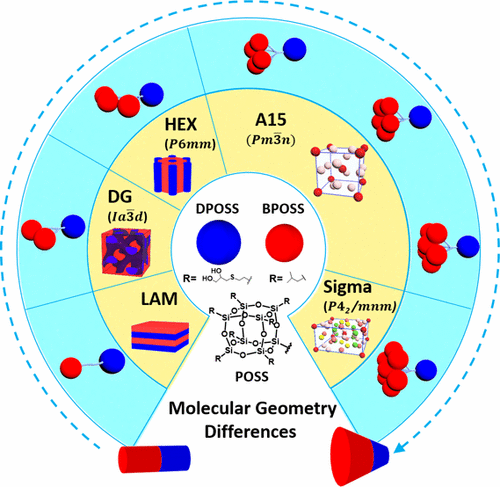当前位置:
X-MOL 学术
›
ACS Cent. Sci.
›
论文详情
Our official English website, www.x-mol.net, welcomes your
feedback! (Note: you will need to create a separate account there.)
Hierarchical Self-Organization of ABn Dendron-like Molecules into a Supramolecular Lattice Sequence
ACS Central Science ( IF 12.7 ) Pub Date : 2017-08-07 00:00:00 , DOI: 10.1021/acscentsci.7b00188 Xueyan Feng 1 , Ruimeng Zhang 1 , Yiwen Li 2 , You-lee Hong 3, 4 , Dong Guo 1 , Kening Lang 1 , Kuan-Yi Wu 1 , Mingjun Huang 1 , Jialin Mao 1 , Chrys Wesdemiotis 1 , Yusuke Nishiyama 3, 4 , Wei Zhang 1 , Wei Zhang 5 , Toshikazu Miyoshi 1 , Tao Li 6 , Stephen Z. D. Cheng 1
ACS Central Science ( IF 12.7 ) Pub Date : 2017-08-07 00:00:00 , DOI: 10.1021/acscentsci.7b00188 Xueyan Feng 1 , Ruimeng Zhang 1 , Yiwen Li 2 , You-lee Hong 3, 4 , Dong Guo 1 , Kening Lang 1 , Kuan-Yi Wu 1 , Mingjun Huang 1 , Jialin Mao 1 , Chrys Wesdemiotis 1 , Yusuke Nishiyama 3, 4 , Wei Zhang 1 , Wei Zhang 5 , Toshikazu Miyoshi 1 , Tao Li 6 , Stephen Z. D. Cheng 1
Affiliation

|
To understand the hierarchical self-organization behaviors of soft materials as well as their dependence on molecular geometry, a series of ABn dendron-like molecules based on polyhedral oligomeric silsesquioxane (POSS) nanoparticles were designed and synthesized. The apex of these molecules is a hydrophilic POSS cage with 14 hydroxyl groups (denoted DPOSS). At its periphery, there are different numbers (n = 1–8) of hydrophobic POSS cages with seven isobutyl groups (denoted BPOSS), connected to the apical DPOSS via flexible dendron type linker(s). By varying the BPOSS number from one to seven, a supramolecular lattice formation sequence ranging from lamella (DPOSS-BPOSS), double gyroid (space group of Ia3̅d, DPOSS-BPOSS2), hexagonal cylinder (plane group of P6mm, DPOSS-BPOSS3), Frank–Kasper A15 (space group of Pm3̅n, DPOSS-BPOSS4, DPOSS-BPOSS5, and DPOSS-BPOSS6), to Frank–Kasper sigma (space group of P42/mnm, DPOSS-BPOSS7) phases can be observed. The nanostructure formations in this series of ABn dendron-like molecules are mainly directed by the molecular geometric shapes. Furthermore, within each spherical motif, the spherical core consists hydrophilic DPOSS cages with flexible linkages, while the hydrophobic BPOSS cages form the relative rigid shell, and contact with neighbors to provide decreased interfaces among the spherical motifs for constructing final polyhedral motifs in these Frank–Kasper lattices. This study provides the design principle of molecules with specific geometric shapes and functional groups to achieve anticipated structures and macroscopic properties.
中文翻译:

AB n树突状分子的分层自组织成超分子晶格序列。
为了了解软材料的分层自组织行为及其对分子几何结构的依赖性,设计并合成了一系列基于多面体低聚倍半硅氧烷(POSS)纳米粒子的AB n树突状分子。这些分子的顶点是带有14个羟基的亲水POSS笼(表示为DPOSS)。在其外围,有7个异丁基(表示为BPOSS)的疏水POSS笼的数量不同(n = 1-8),它们通过柔性树突型连接子连接到顶端DPOSS。通过改变BPOSS数从1到7范围从薄片(DPOSS-BPOSS),双螺旋(空间群的超分子晶格形成顺序IA 3 d,DPOSS-BPOSS 2),六角柱(平面组的P 6毫米,DPOSS-BPOSS 3),弗兰克-卡斯帕A15(空间群的PM 3 Ñ,DPOSS-BPOSS 4,DPOSS-BPOSS 5,和DPOSS-BPOSS 6),以Frank-可以观察到Kasper sigma(P 4 2 / mnm的空间群,DPOSS-BPOSS 7)相。AB n系列的纳米结构形成树突状分子主要由分子的几何形状指导。此外,在每个球形基序中,球形核心均包含具有柔性连接的亲水性DPOSS笼,而疏水性BPOSS笼形成相对刚性的壳,并与邻居接触以减少球形基序之间的界面,从而在这些Frank-卡巴斯尔格子。这项研究提供了具有特定几何形状和官能团的分子的设计原理,以实现预期的结构和宏观性能。
更新日期:2017-08-23
中文翻译:

AB n树突状分子的分层自组织成超分子晶格序列。
为了了解软材料的分层自组织行为及其对分子几何结构的依赖性,设计并合成了一系列基于多面体低聚倍半硅氧烷(POSS)纳米粒子的AB n树突状分子。这些分子的顶点是带有14个羟基的亲水POSS笼(表示为DPOSS)。在其外围,有7个异丁基(表示为BPOSS)的疏水POSS笼的数量不同(n = 1-8),它们通过柔性树突型连接子连接到顶端DPOSS。通过改变BPOSS数从1到7范围从薄片(DPOSS-BPOSS),双螺旋(空间群的超分子晶格形成顺序IA 3 d,DPOSS-BPOSS 2),六角柱(平面组的P 6毫米,DPOSS-BPOSS 3),弗兰克-卡斯帕A15(空间群的PM 3 Ñ,DPOSS-BPOSS 4,DPOSS-BPOSS 5,和DPOSS-BPOSS 6),以Frank-可以观察到Kasper sigma(P 4 2 / mnm的空间群,DPOSS-BPOSS 7)相。AB n系列的纳米结构形成树突状分子主要由分子的几何形状指导。此外,在每个球形基序中,球形核心均包含具有柔性连接的亲水性DPOSS笼,而疏水性BPOSS笼形成相对刚性的壳,并与邻居接触以减少球形基序之间的界面,从而在这些Frank-卡巴斯尔格子。这项研究提供了具有特定几何形状和官能团的分子的设计原理,以实现预期的结构和宏观性能。











































 京公网安备 11010802027423号
京公网安备 11010802027423号